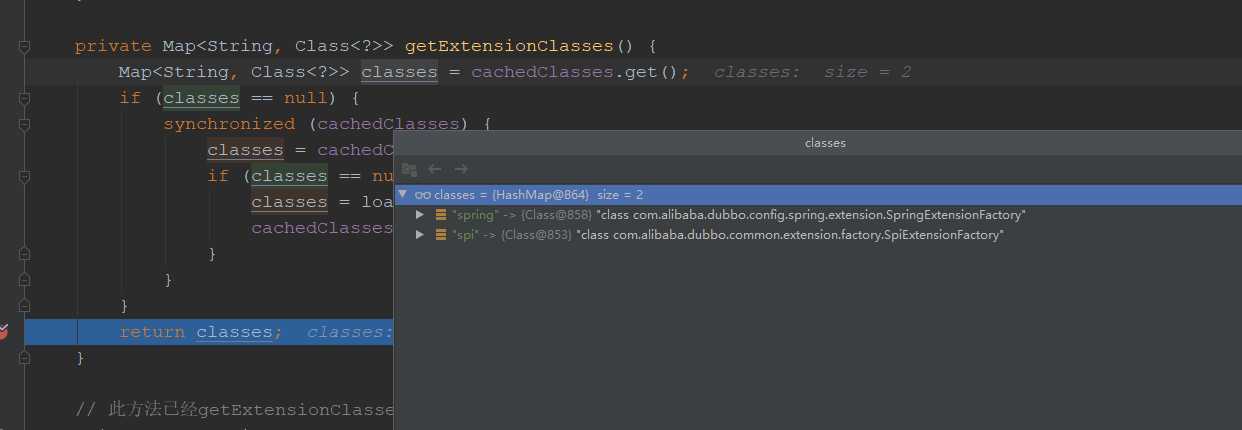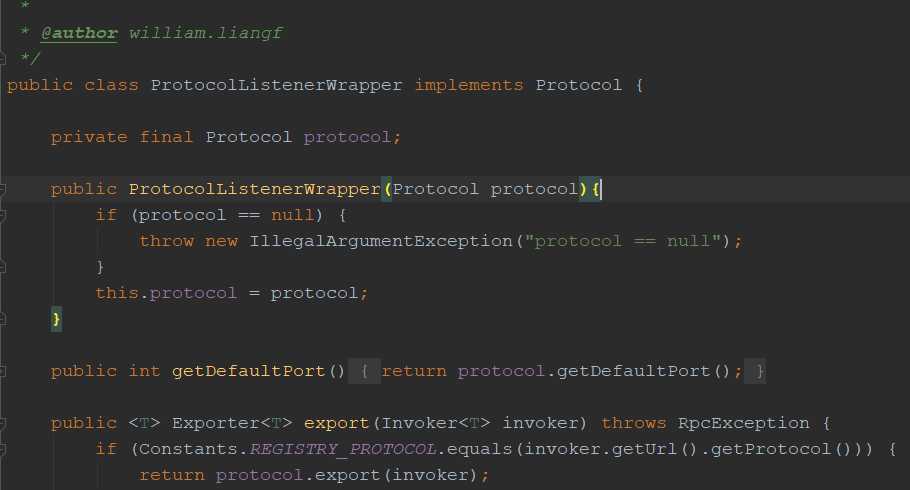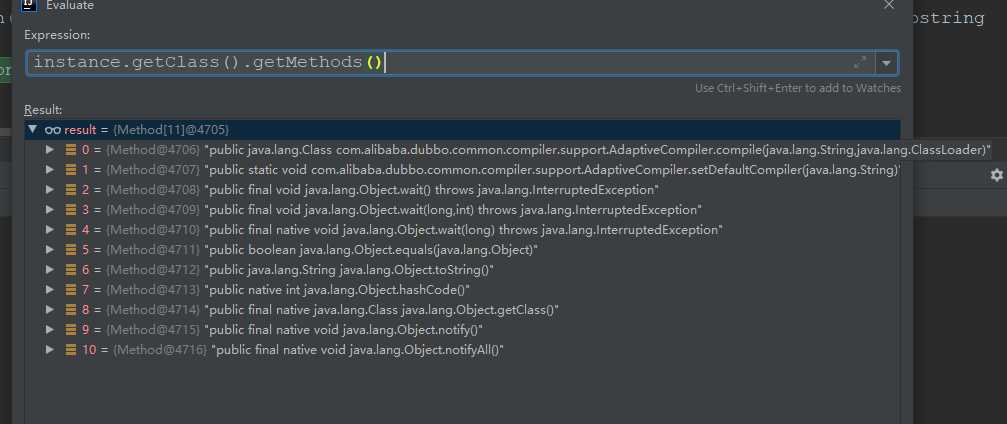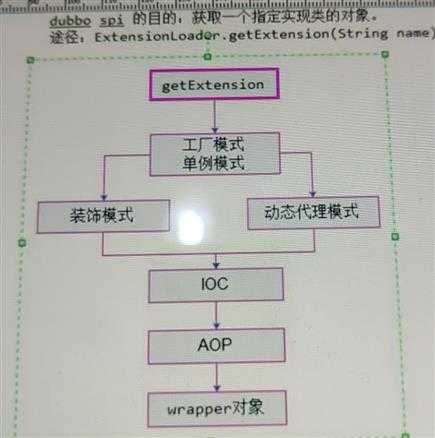标签:自己实现 读取 val Opens size cache ext main 目标
Dubbo 自己实现的SPI 用于获取一个实现类的对象
一、为什么Dubbo要自己设计一套SPI
1.原始的JDK SPI不支持缓存: Dubbo设计了缓存对象-cachedInstances 是一个 new ConcurrentHashMap<String, Holder<Object>>()
2.原始JDK SPI不支持默认值: Dubbo设计默认值 -@SPI("dubbo")代表默认的spi对象
例如 Protocol的@SPI("dubbo")就是DubboProtocol通过ExtensionLoader.getExtensionLoader(Protocol.class).getDefaultExtension()拿默认对象
3.JDK要使用For循环判断对象: Dubbo设计的getExtension灵活方便,动态获取spi对象
例如 ExtensionLoader.getExtensionLoader(Protocol.class).getExtension(spi的key)来提取对象
4.原始JDK不支持AOP功能: Dubbo设计增加了AOP功能,在cachedWrapperClasses,在原始类,包装了XxxxFilterWrapper XxxxListenerWrapper
例如 ProtocolFilterWrapper
5.原始JDK不支持IOC功能: Dubbo设计增加了IOC,通过构造函数注入代码
例如 wrapperClass.getConstructor(type).newInstance(instance)
首先获得自适应扩展点的Class对象,然后通过反射获取实例,将对象创建的权力交给框架,这就是控制反转
二、Dubbo中实现路径
途径:
ExtensionLoader.getExtension(String name)
实现路径:
getExtensionLoader(Class<T> type) new 一个ExtensionLoader,然后缓存起来
getAdaptiveExtension() 获取一个扩展装饰类的对象,这个类有一个规则,如果它没有一个@Adaptive注解,就动态创建一个代理类.例如 Protocol$Adaptive对象
getExtension(String name) 获取一个对象
public class ExtensionLoader<T> {
private static final Logger logger = LoggerFactory.getLogger(ExtensionLoader.class);
private static final String SERVICES_DIRECTORY = "META-INF/services/";
private static final String DUBBO_DIRECTORY = "META-INF/dubbo/";
private static final String DUBBO_INTERNAL_DIRECTORY = DUBBO_DIRECTORY + "internal/";
private static final Pattern NAME_SEPARATOR = Pattern.compile("\\s*[,]+\\s*");
private static final ConcurrentMap<Class<?>, ExtensionLoader<?>> EXTENSION_LOADERS = new ConcurrentHashMap<Class<?>, ExtensionLoader<?>>(); // 缓存spi对象和Extension对象的映射
private static final ConcurrentMap<Class<?>, Object> EXTENSION_INSTANCES = new ConcurrentHashMap<Class<?>, Object>();
// ==============================
private final Class<?> type;
private final ExtensionFactory objectFactory;
private final ConcurrentMap<Class<?>, String> cachedNames = new ConcurrentHashMap<Class<?>, String>(); // 缓存扩展实现类与name的映射关系
private final Holder<Map<String, Class<?>>> cachedClasses = new Holder<Map<String,Class<?>>>(); // 将缓存loadFile方法的入参,extensionClasses存储的是扩展实现类name和Class对象的映射
private final Map<String, Activate> cachedActivates = new ConcurrentHashMap<String, Activate>(); // 缓存扩展实现类name与激活信息的映射
private volatile Class<?> cachedAdaptiveClass = null; //缓存@Adaptive的扩展实现类型
private final ConcurrentMap<String, Holder<Object>> cachedInstances = new ConcurrentHashMap<String, Holder<Object>>();
private String cachedDefaultName;
private final Holder<Object> cachedAdaptiveInstance = new Holder<Object>(); // adaptive的缓存对象
private volatile Throwable createAdaptiveInstanceError;
private Set<Class<?>> cachedWrapperClasses; // 缓存扩展实现类中的wrapper包装类
private Map<String, IllegalStateException> exceptions = new ConcurrentHashMap<String, IllegalStateException>();
private static <T> boolean withExtensionAnnotation(Class<T> type) {
return type.isAnnotationPresent(SPI.class);
}
.......
}
三、代码流程
-->getExtensionLoader(Class<T> type)
-->new ExtensionLoader<T>(type)
-->ExtensionLoader.getExtensionLoader(ExtensionFactory.class).getAdaptiveExtension())
-->getAdaptiveExtension() 为cachedAdaptiveInstance赋值
-->createAdaptiveExtension()
--> injectExtension((T) getAdaptiveExtensionClass().newInstance()) 这里运用了IOC 以及 DI 思想
-->getAdaptiveExtensionClass
-->getExtensionClasses() 为cachedClasses赋值
-->loadExtensionClasses()
-->loadFile(Map<String, Class<?>> extensionClasses, String dir) 加载文件中的类路径 已经将类存入 cachedAdaptiveClass,cachedWrapperClasses,cachedActivates,cachedNames
-->createAdaptiveExtensionClass() 自动生成和编译一个动态的adadtive代理类
-->createAdaptiveExtensionClassCode() 生成对应的代理类代码
--> com.alibaba.dubbo.common.compiler.Compiler compiler = ExtensionLoader.getExtensionLoader(com.alibaba.dubbo.common.compiler.Compiler.class).getAdaptiveExtension()
-->compiler.compile(code, classLoader) 生成对应类对象
-->getExtension(String name) 返回指定名称的扩展
-->createExtension(String name)
-->getExtensionClasses 获取对应所有类对象
-->injectExtension(instance)
-->injectExtension(T instance) 进入IOC的反转控制模式,实现了动态注入
-->objectFactory.getExtension(pt, property)
-->SpiExtensionFactory.getExtension(type,name)
-->ExtensionLoader.getExtensionLoader(type)
-->loader.getAdaptiveExtension()
-->SpringExtensionFactory.getExtension(type,name)
-->context.getBean(name)
四、代码解析
dubbo入口 com.alibaba.dubbo.container.Main
public class Main {
public static final String CONTAINER_KEY = "dubbo.container";
public static final String SHUTDOWN_HOOK_KEY = "dubbo.shutdown.hook";
private static final Logger logger = LoggerFactory.getLogger(Main.class);
private static final ExtensionLoader<Container> loader = ExtensionLoader.getExtensionLoader(Container.class);
private static volatile boolean running = true;
public static void main(String[] args) {
try {
if (args == null || args.length == 0) {
String config = ConfigUtils.getProperty(CONTAINER_KEY, loader.getDefaultExtensionName());
args = Constants.COMMA_SPLIT_PATTERN.split(config);
}
final List<Container> containers = new ArrayList<Container>();
for (int i = 0; i < args.length; i ++) {
containers.add(loader.getExtension(args[i]));
}
logger.info("Use container type(" + Arrays.toString(args) + ") to run dubbo serivce.");
if ("true".equals(System.getProperty(SHUTDOWN_HOOK_KEY))) {
Runtime.getRuntime().addShutdownHook(new Thread() {
public void run() {
for (Container container : containers) {
try {
container.stop();
logger.info("Dubbo " + container.getClass().getSimpleName() + " stopped!");
} catch (Throwable t) {
logger.error(t.getMessage(), t);
}
synchronized (Main.class) {
running = false;
Main.class.notify();
}
}
}
});
}
for (Container container : containers) {
container.start(); // 启动容器方法
logger.info("Dubbo " + container.getClass().getSimpleName() + " started!");
}
System.out.println(new SimpleDateFormat("[yyyy-MM-dd HH:mm:ss]").format(new Date()) + " Dubbo service server started!");
} catch (RuntimeException e) {
e.printStackTrace();
logger.error(e.getMessage(), e);
System.exit(1);
}
synchronized (Main.class) {
while (running) {
try {
Main.class.wait();
} catch (Throwable e) {
}
}
}
}
}
从 EXTENSION_LOADERS(存储SPI对象和ExtensionLoader对应关系)中拿到对应对象
public static <T> ExtensionLoader<T> getExtensionLoader(Class<T> type) { if (type == null) throw new IllegalArgumentException("Extension type == null"); if(!type.isInterface()) { throw new IllegalArgumentException("Extension type(" + type + ") is not interface!"); } if(!withExtensionAnnotation(type)) { throw new IllegalArgumentException("Extension type(" + type + ") is not extension, because WITHOUT @" + SPI.class.getSimpleName() + " Annotation!"); } // 从缓存中获取该对象 ExtensionLoader<T> loader = (ExtensionLoader<T>) EXTENSION_LOADERS.get(type); if (loader == null) {
// 此处使用putIfAbsent 有值就返回,不和put一样有替换的操作 EXTENSION_LOADERS.putIfAbsent(type, new ExtensionLoader<T>(type)); loader = (ExtensionLoader<T>) EXTENSION_LOADERS.get(type); } return loader; }
缓存中不存在,组建ExtensionLoader对象,组建type+objectFactory对象
objectFactory 它就是为dubbo的IOC提供所有对象
private ExtensionLoader(Class<?> type) {
this.type = type;
objectFactory = (type == ExtensionFactory.class ? null : ExtensionLoader.getExtensionLoader(ExtensionFactory.class).getAdaptiveExtension());
}
@Adaptive
注解在类上: 代表人工编码实现,Dubbo不会为该类生成代理类 例如 ExtensionFactory
注解在方法上: Dubbo会为该方法实现代理逻辑 例如Protocol$Adaptive
获取对应Adaptive对象,然后放入cachedAdaptiveInstance 缓存中
public T getAdaptiveExtension() {
// 获取 adaptive缓存对象 Object instance = cachedAdaptiveInstance.get(); if (instance == null) { if(createAdaptiveInstanceError == null) { synchronized (cachedAdaptiveInstance) { instance = cachedAdaptiveInstance.get(); if (instance == null) { try {
// 没有创建adaptive对象 instance = createAdaptiveExtension(); cachedAdaptiveInstance.set(instance); } catch (Throwable t) { createAdaptiveInstanceError = t; throw new IllegalStateException("fail to create adaptive instance: " + t.toString(), t); } } } } else { throw new IllegalStateException("fail to create adaptive instance: " + createAdaptiveInstanceError.toString(), createAdaptiveInstanceError); } } return (T) instance; }
创建自适应的扩展类 newInstance传教兑现实例
private T createAdaptiveExtension() { try {
// 获取该对象 实例化后注入extension return injectExtension((T) getAdaptiveExtensionClass().newInstance()); } catch (Exception e) { throw new IllegalStateException("Can not create adaptive extenstion " + type + ", cause: " + e.getMessage(), e); } }
获取自适应扩展点的细节
private Class<?> getAdaptiveExtensionClass() { getExtensionClasses(); if (cachedAdaptiveClass != null) { // 如果扩展点的实现类有@Adaptive注解,则直接返回该实现类 return cachedAdaptiveClass; }
// 否则创建自适应的代理类 return cachedAdaptiveClass = createAdaptiveExtensionClass(); }
spring=com.alibaba.dubbo.config.spring.extension.SpringExtensionFactory
cachedClasses存储类似spring 与 com.alibaba.dubbo.config.spring.extension.SpringExtensionFactory 对应关系
private Map<String, Class<?>> getExtensionClasses() {
Map<String, Class<?>> classes = cachedClasses.get();
if (classes == null) {
synchronized (cachedClasses) {
classes = cachedClasses.get();
if (classes == null) {
classes = loadExtensionClasses();
cachedClasses.set(classes);
}
}
}
return classes;
}

加载对应class 类
// 此方法已经getExtensionClasses方法同步过。
private Map<String, Class<?>> loadExtensionClasses() {
final SPI defaultAnnotation = type.getAnnotation(SPI.class);
if(defaultAnnotation != null) {
String value = defaultAnnotation.value();
if(value != null && (value = value.trim()).length() > 0) {
String[] names = NAME_SEPARATOR.split(value);
if(names.length > 1) {
throw new IllegalStateException("more than 1 default extension name on extension " + type.getName()
+ ": " + Arrays.toString(names));
}
if(names.length == 1) cachedDefaultName = names[0];
}
}
Map<String, Class<?>> extensionClasses = new HashMap<String, Class<?>>();
loadFile(extensionClasses, DUBBO_INTERNAL_DIRECTORY); // 真正使用这一行
loadFile(extensionClasses, DUBBO_DIRECTORY);
loadFile(extensionClasses, SERVICES_DIRECTORY);
return extensionClasses;
}
加载配置文件信息拿到对应className
private void loadFile(Map<String, Class<?>> extensionClasses, String dir) {
// 拼装相对路径 类似 META-INF/dubbo/internal/com.alibaba.dubbo.rpc.Protocol String fileName = dir + type.getName();
try { Enumeration<java.net.URL> urls; ClassLoader classLoader = findClassLoader(); if (classLoader != null) {
// getResources() 获取项目文件 urls = classLoader.getResources(fileName); } else {
// 使用系统的classLoader然后调用getResource urls = ClassLoader.getSystemResources(fileName); } if (urls != null) { while (urls.hasMoreElements()) { java.net.URL url = urls.nextElement(); try {
// 读取绝对路径对应文件内容 BufferedReader reader = new BufferedReader(new InputStreamReader(url.openStream(), "utf-8")); try { String line = null;
// 一行行读 while ((line = reader.readLine()) != null) { final int ci = line.indexOf(‘#‘); if (ci >= 0) line = line.substring(0, ci); line = line.trim(); if (line.length() > 0) { try { String name = null; int i = line.indexOf(‘=‘); if (i > 0) { name = line.substring(0, i).trim(); line = line.substring(i + 1).trim(); } if (line.length() > 0) {
// 那对对应class Class<?> clazz = Class.forName(line, true, classLoader);
// isAssignableFrom type对象所表示的类或者接口,与clazz所表示的类是否是其超类或者超接口,是 返回true,否 返回false if (! type.isAssignableFrom(clazz)) { throw new IllegalStateException("Error when load extension class(interface: " + type + ", class line: " + clazz.getName() + "), class " + clazz.getName() + "is not subtype of interface."); }
// 判断是否为 Adaptive 加入到对应 cacheAdaptiveClass 缓存中 clazz类上是否有Adaptive 的注解 if (clazz.isAnnotationPresent(Adaptive.class)) { if(cachedAdaptiveClass == null) { cachedAdaptiveClass = clazz; } else if (! cachedAdaptiveClass.equals(clazz)) { throw new IllegalStateException("More than 1 adaptive class found: " + cachedAdaptiveClass.getClass().getName() + ", " + clazz.getClass().getName()); } } else {
// 无@Adaptive注解 try {
// 匹配对应的构造参数 ,只有当该class有目标接口构造方法 进入 cacheWarapperClasses缓存 类似 ProtocolFilterWarppeer 和 ProtocolListenerWarpper符合条件 clazz.getConstructor(type); Set<Class<?>> wrappers = cachedWrapperClasses; if (wrappers == null) { cachedWrapperClasses = new ConcurrentHashSet<Class<?>>(); wrappers = cachedWrapperClasses; } wrappers.add(clazz); } catch (NoSuchMethodException e) {
// 其他无参构造 进入cacheActivates和cacheNames缓存 clazz.getConstructor(); if (name == null || name.length() == 0) { name = findAnnotationName(clazz); if (name == null || name.length() == 0) { if (clazz.getSimpleName().length() > type.getSimpleName().length() && clazz.getSimpleName().endsWith(type.getSimpleName())) { name = clazz.getSimpleName().substring(0, clazz.getSimpleName().length() - type.getSimpleName().length()).toLowerCase(); } else { throw new IllegalStateException("No such extension name for the class " + clazz.getName() + " in the config " + url); } } } String[] names = NAME_SEPARATOR.split(name); if (names != null && names.length > 0) { Activate activate = clazz.getAnnotation(Activate.class);
// 有@Activate注解的进入cachedActivates缓存 if (activate != null) { cachedActivates.put(names[0], activate); }
// 排除wrapper 的类其他类进入cacheNames中 for (String n : names) { if (! cachedNames.containsKey(clazz)) { cachedNames.put(clazz, n); } Class<?> c = extensionClasses.get(n); if (c == null) { extensionClasses.put(n, clazz); } else if (c != clazz) { throw new IllegalStateException("Duplicate extension " + type.getName() + " name " + n + " on " + c.getName() + " and " + clazz.getName()); } } } } } } } catch (Throwable t) { IllegalStateException e = new IllegalStateException("Failed to load extension class(interface: " + type + ", class line: " + line + ") in " + url + ", cause: " + t.getMessage(), t); exceptions.put(line, e); } } } // end of while read lines } finally { reader.close(); } } catch (Throwable t) { logger.error("Exception when load extension class(interface: " + type + ", class file: " + url + ") in " + url, t); } } // end of while urls } } catch (Throwable t) { logger.error("Exception when load extension class(interface: " + type + ", description file: " + fileName + ").", t); } }
ProtocolListenerWrapper 符合 clazz.getConstructor(type); 条件

创建对应的包装类--自动生成一个动态的 adaptive 类
private Class<?> createAdaptiveExtensionClass() {
String code = createAdaptiveExtensionClassCode();
ClassLoader classLoader = findClassLoader();
com.alibaba.dubbo.common.compiler.Compiler compiler = ExtensionLoader.getExtensionLoader(com.alibaba.dubbo.common.compiler.Compiler.class).getAdaptiveExtension();
return compiler.compile(code, classLoader);
}
生成对应代理类的code代码
private String createAdaptiveExtensionClassCode() {
StringBuilder codeBuidler = new StringBuilder();
Method[] methods = type.getMethods();
boolean hasAdaptiveAnnotation = false;
// 判断所有的方法上有没有@Adaptive注解
for(Method m : methods) {
if(m.isAnnotationPresent(Adaptive.class)) {
hasAdaptiveAnnotation = true;
break;
}
}
// 完全没有Adaptive方法,则不需要生成Adaptive类
if(! hasAdaptiveAnnotation)
throw new IllegalStateException("No adaptive method on extension " + type.getName() + ", refuse to create the adaptive class!");
codeBuidler.append("package " + type.getPackage().getName() + ";");
codeBuidler.append("\nimport " + ExtensionLoader.class.getName() + ";");
codeBuidler.append("\npublic class " + type.getSimpleName() + "$Adpative" + " implements " + type.getCanonicalName() + " {");
for (Method method : methods) {
Class<?> rt = method.getReturnType();
Class<?>[] pts = method.getParameterTypes();
Class<?>[] ets = method.getExceptionTypes();
Adaptive adaptiveAnnotation = method.getAnnotation(Adaptive.class);
StringBuilder code = new StringBuilder(512);
if (adaptiveAnnotation == null) {
code.append("throw new UnsupportedOperationException(\"method ")
.append(method.toString()).append(" of interface ")
.append(type.getName()).append(" is not adaptive method!\");");
} else {
int urlTypeIndex = -1;
for (int i = 0; i < pts.length; ++i) {
if (pts[i].equals(URL.class)) {
urlTypeIndex = i;
break;
}
}
// 有类型为URL的参数
if (urlTypeIndex != -1) {
// Null Point check
String s = String.format("\nif (arg%d == null) throw new IllegalArgumentException(\"url == null\");",
urlTypeIndex);
code.append(s);
s = String.format("\n%s url = arg%d;", URL.class.getName(), urlTypeIndex);
code.append(s);
}
// 参数没有URL类型
else {
String attribMethod = null;
// 找到参数的URL属性
LBL_PTS:
for (int i = 0; i < pts.length; ++i) {
Method[] ms = pts[i].getMethods();
for (Method m : ms) {
String name = m.getName();
if ((name.startsWith("get") || name.length() > 3)
&& Modifier.isPublic(m.getModifiers())
&& !Modifier.isStatic(m.getModifiers())
&& m.getParameterTypes().length == 0
&& m.getReturnType() == URL.class) {
urlTypeIndex = i;
attribMethod = name;
break LBL_PTS;
}
}
}
if(attribMethod == null) {
throw new IllegalStateException("fail to create adative class for interface " + type.getName()
+ ": not found url parameter or url attribute in parameters of method " + method.getName());
}
// Null point check
String s = String.format("\nif (arg%d == null) throw new IllegalArgumentException(\"%s argument == null\");",
urlTypeIndex, pts[urlTypeIndex].getName());
code.append(s);
s = String.format("\nif (arg%d.%s() == null) throw new IllegalArgumentException(\"%s argument %s() == null\");",
urlTypeIndex, attribMethod, pts[urlTypeIndex].getName(), attribMethod);
code.append(s);
s = String.format("%s url = arg%d.%s();",URL.class.getName(), urlTypeIndex, attribMethod);
code.append(s);
}
String[] value = adaptiveAnnotation.value();
// 没有设置Key,则使用“扩展点接口名的点分隔 作为Key
if(value.length == 0) {
char[] charArray = type.getSimpleName().toCharArray();
StringBuilder sb = new StringBuilder(128);
for (int i = 0; i < charArray.length; i++) {
if(Character.isUpperCase(charArray[i])) {
if(i != 0) {
sb.append(".");
}
sb.append(Character.toLowerCase(charArray[i]));
}
else {
sb.append(charArray[i]);
}
}
value = new String[] {sb.toString()};
}
boolean hasInvocation = false;
for (int i = 0; i < pts.length; ++i) {
if (pts[i].getName().equals("com.alibaba.dubbo.rpc.Invocation")) {
// Null Point check
String s = String.format("\nif (arg%d == null) throw new IllegalArgumentException(\"invocation == null\");", i);
code.append(s);
s = String.format("\nString methodName = arg%d.getMethodName();", i);
code.append(s);
hasInvocation = true;
break;
}
}
String defaultExtName = cachedDefaultName;
String getNameCode = null;
for (int i = value.length - 1; i >= 0; --i) {
if(i == value.length - 1) {
if(null != defaultExtName) {
if(!"protocol".equals(value[i]))
if (hasInvocation)
getNameCode = String.format("url.getMethodParameter(methodName, \"%s\", \"%s\")", value[i], defaultExtName);
else
getNameCode = String.format("url.getParameter(\"%s\", \"%s\")", value[i], defaultExtName);
else
getNameCode = String.format("( url.getProtocol() == null ? \"%s\" : url.getProtocol() )", defaultExtName);
}
else {
if(!"protocol".equals(value[i]))
if (hasInvocation)
getNameCode = String.format("url.getMethodParameter(methodName, \"%s\", \"%s\")", value[i], defaultExtName);
else
getNameCode = String.format("url.getParameter(\"%s\")", value[i]);
else
getNameCode = "url.getProtocol()";
}
}
else {
if(!"protocol".equals(value[i]))
if (hasInvocation)
getNameCode = String.format("url.getMethodParameter(methodName, \"%s\", \"%s\")", value[i], defaultExtName);
else
getNameCode = String.format("url.getParameter(\"%s\", %s)", value[i], getNameCode);
else
getNameCode = String.format("url.getProtocol() == null ? (%s) : url.getProtocol()", getNameCode);
}
}
code.append("\nString extName = ").append(getNameCode).append(";");
// check extName == null?
String s = String.format("\nif(extName == null) " +
"throw new IllegalStateException(\"Fail to get extension(%s) name from url(\" + url.toString() + \") use keys(%s)\");",
type.getName(), Arrays.toString(value));
code.append(s);
s = String.format("\n%s extension = (%<s)%s.getExtensionLoader(%s.class).getExtension(extName);",
type.getName(), ExtensionLoader.class.getSimpleName(), type.getName());
code.append(s);
// return statement
if (!rt.equals(void.class)) {
code.append("\nreturn ");
}
s = String.format("extension.%s(", method.getName());
code.append(s);
for (int i = 0; i < pts.length; i++) {
if (i != 0)
code.append(", ");
code.append("arg").append(i);
}
code.append(");");
}
codeBuidler.append("\npublic " + rt.getCanonicalName() + " " + method.getName() + "(");
for (int i = 0; i < pts.length; i ++) {
if (i > 0) {
codeBuidler.append(", ");
}
codeBuidler.append(pts[i].getCanonicalName());
codeBuidler.append(" ");
codeBuidler.append("arg" + i);
}
codeBuidler.append(")");
if (ets.length > 0) {
codeBuidler.append(" throws ");
for (int i = 0; i < ets.length; i ++) {
if (i > 0) {
codeBuidler.append(", ");
}
codeBuidler.append(pts[i].getCanonicalName());
}
}
codeBuidler.append(" {");
codeBuidler.append(code.toString());
codeBuidler.append("\n}");
}
codeBuidler.append("\n}");
if (logger.isDebugEnabled()) {
logger.debug(codeBuidler.toString());
}
return codeBuidler.toString();
}
默认生成的code代码类-发现@Adaptive 注解的都没有实现
public class Protocol$Adpative implements com.alibaba.dubbo.rpc.Protocol {
public void destroy() {
throw new UnsupportedOperationException("method public abstract void com.alibaba.dubbo.rpc.Protocol.destroy() of interface com.alibaba.dubbo.rpc.Protocol is not adaptive method!");
}
public int getDefaultPort() {
throw new UnsupportedOperationException("method public abstract int com.alibaba.dubbo.rpc.Protocol.getDefaultPort() of interface com.alibaba.dubbo.rpc.Protocol is not adaptive method!");
}
public com.alibaba.dubbo.rpc.Exporter export(com.alibaba.dubbo.rpc.Invoker arg0) throws com.alibaba.dubbo.rpc.Invoker {
if (arg0 == null) throw new IllegalArgumentException("com.alibaba.dubbo.rpc.Invoker argument == null");
if (arg0.getUrl() == null)
throw new IllegalArgumentException("com.alibaba.dubbo.rpc.Invoker argument getUrl() == null");
com.alibaba.dubbo.common.URL url = arg0.getUrl();
String extName = (url.getProtocol() == null ? "dubbo" : url.getProtocol());
if (extName == null)
throw new IllegalStateException("Fail to get extension(com.alibaba.dubbo.rpc.Protocol) name from url(" + url.toString() + ") use keys([protocol])");
com.alibaba.dubbo.rpc.Protocol extension = (com.alibaba.dubbo.rpc.Protocol) ExtensionLoader.getExtensionLoader(com.alibaba.dubbo.rpc.Protocol.class).getExtension(extName);
return extension.export(arg0);
}
public com.alibaba.dubbo.rpc.Invoker refer(java.lang.Class arg0, com.alibaba.dubbo.common.URL arg1) throws java.lang.Class {
if (arg1 == null) throw new IllegalArgumentException("url == null");
com.alibaba.dubbo.common.URL url = arg1;
String extName = (url.getProtocol() == null ? "dubbo" : url.getProtocol());
if (extName == null)
throw new IllegalStateException("Fail to get extension(com.alibaba.dubbo.rpc.Protocol) name from url(" + url.toString() + ") use keys([protocol])");
com.alibaba.dubbo.rpc.Protocol extension = (com.alibaba.dubbo.rpc.Protocol) ExtensionLoader.getExtensionLoader(com.alibaba.dubbo.rpc.Protocol.class).getExtension(extName);
return extension.refer(arg0, arg1);
}
}
返回指定名称的扩展类
public T getExtension(String name) {
if (name == null || name.length() == 0)
throw new IllegalArgumentException("Extension name == null");
if ("true".equals(name)) {
return getDefaultExtension();
}
Holder<Object> holder = cachedInstances.get(name);
if (holder == null) {
cachedInstances.putIfAbsent(name, new Holder<Object>());
holder = cachedInstances.get(name);
}
Object instance = holder.get();
if (instance == null) {
synchronized (holder) {
instance = holder.get();
if (instance == null) {
instance = createExtension(name);
holder.set(instance);
}
}
}
return (T) instance;
}
private T createExtension(String name) {
Class<?> clazz = getExtensionClasses().get(name);
if (clazz == null) {
throw findException(name);
}
try {
T instance = (T) EXTENSION_INSTANCES.get(clazz);
if (instance == null) {
EXTENSION_INSTANCES.putIfAbsent(clazz, (T) clazz.newInstance());
instance = (T) EXTENSION_INSTANCES.get(clazz);
}
injectExtension(instance);
Set<Class<?>> wrapperClasses = cachedWrapperClasses;
if (wrapperClasses != null && wrapperClasses.size() > 0) {
for (Class<?> wrapperClass : wrapperClasses) {
instance = injectExtension((T) wrapperClass.getConstructor(type).newInstance(instance));
}
}
return instance;
} catch (Throwable t) {
throw new IllegalStateException("Extension instance(name: " + name + ", class: " +
type + ") could not be instantiated: " + t.getMessage(), t);
}
}
注入
private T injectExtension(T instance) {
try {
if (objectFactory != null) {
// 提取所有方法
for (Method method : instance.getClass().getMethods()) {
// 查询是否有set方法
if (method.getName().startsWith("set")
&& method.getParameterTypes().length == 1
&& Modifier.isPublic(method.getModifiers())) {
Class<?> pt = method.getParameterTypes()[0];
try {
String property = method.getName().length() > 3 ? method.getName().substring(3, 4).toLowerCase() + method.getName().substring(4) : "";
Object object = objectFactory.getExtension(pt, property);
if (object != null) {
method.invoke(instance, object);
}
} catch (Exception e) {
logger.error("fail to inject via method " + method.getName()
+ " of interface " + type.getName() + ": " + e.getMessage(), e);
}
}
}
}
} catch (Exception e) {
logger.error(e.getMessage(), e);
}
return instance;
}

public <T> T getExtension(Class<T> type, String name) {
for (ExtensionFactory factory : factories) {
T extension = factory.getExtension(type, name);
if (extension != null) {
return extension;
}
}
return null;
}

标签:自己实现 读取 val Opens size cache ext main 目标
原文地址:https://www.cnblogs.com/huan30/p/12723574.html